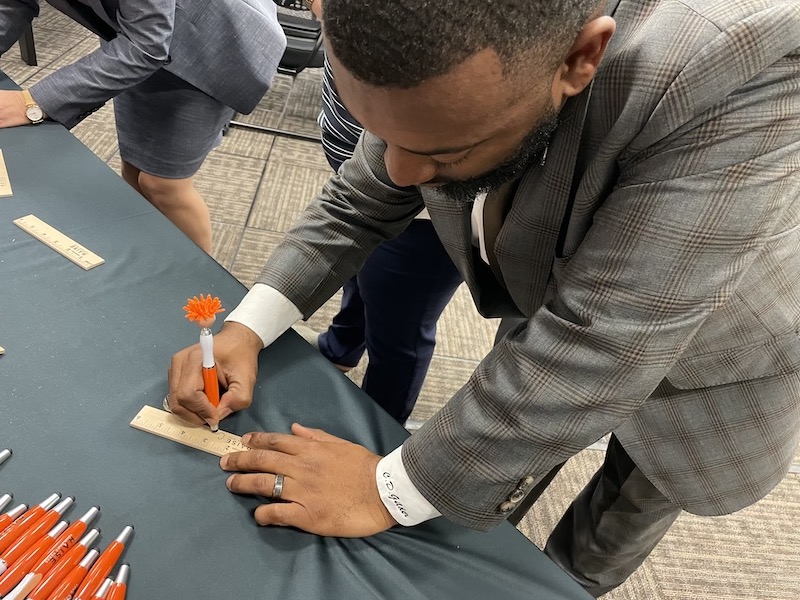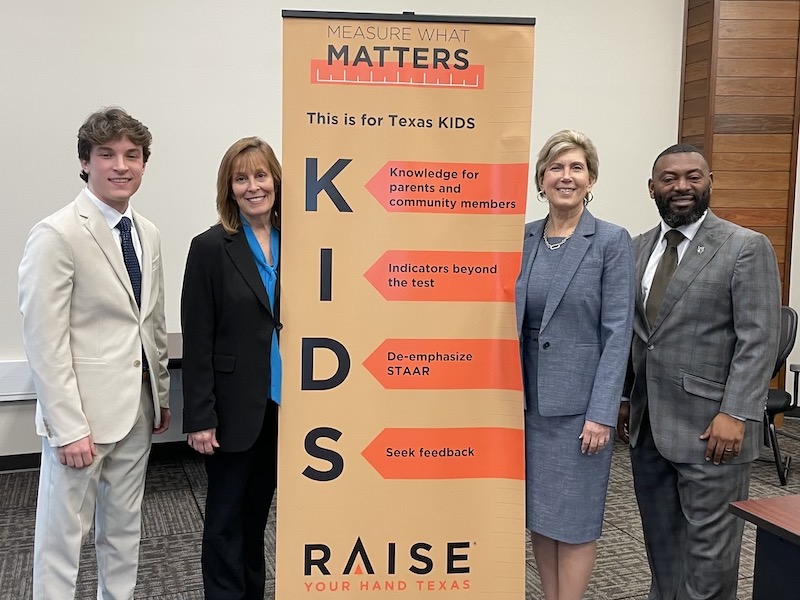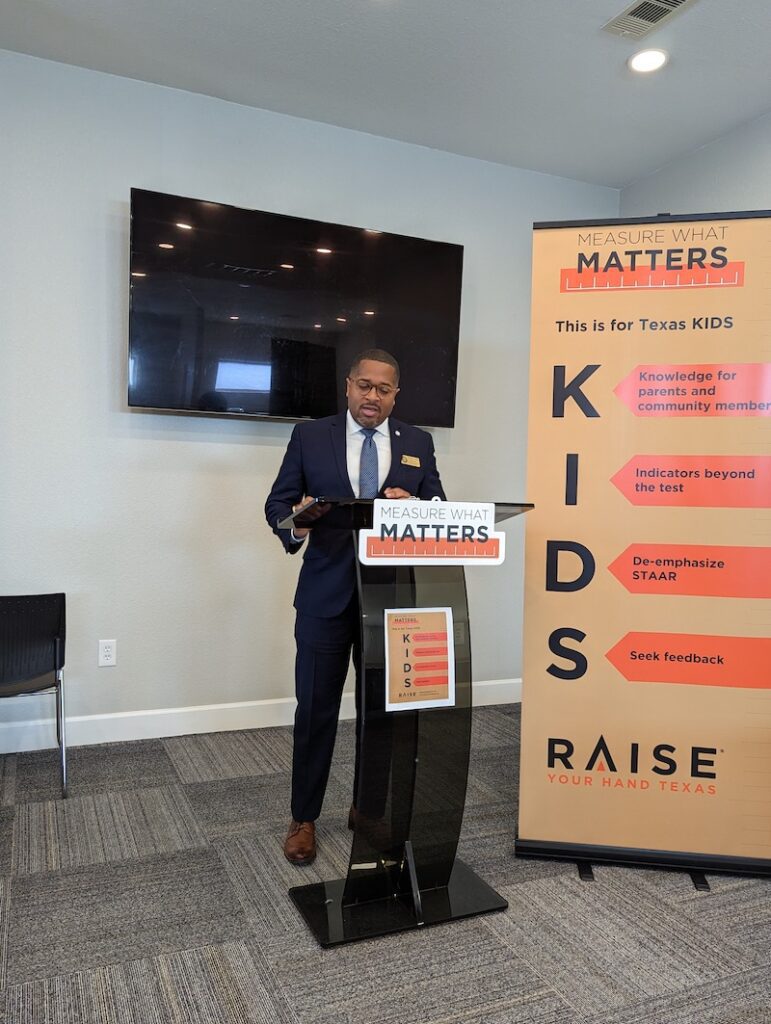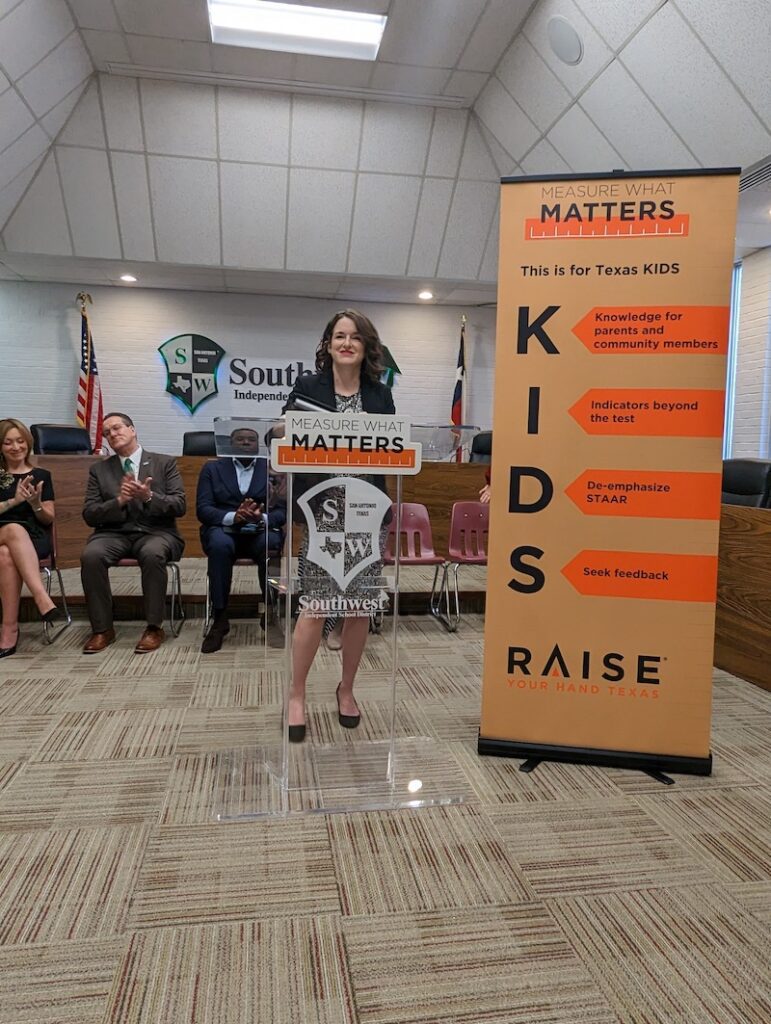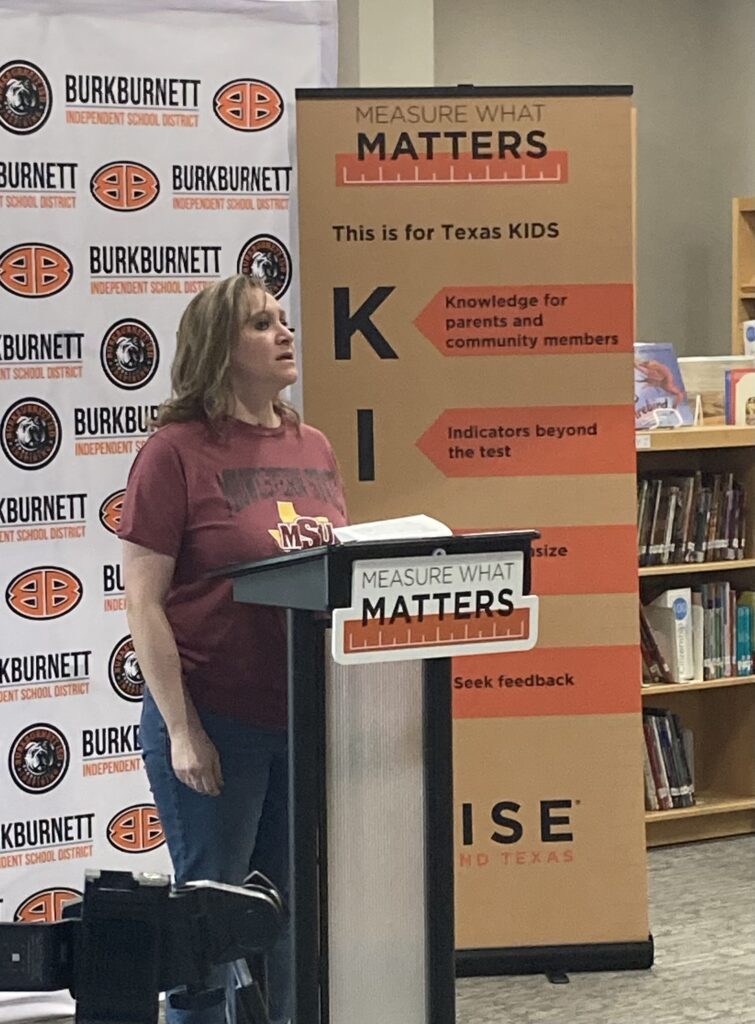
categories
THE STAAR TEST IS ONLY PART OF WHAT HAPPENS IN OUR SCHOOLS

March 29, 2023
Let’s Tell the Whole Story of Student Success
When it comes to evaluating how our students are learning and preparing for the 21st-century workforce, one message is nearly universal: the STAAR test does not tell the whole story.
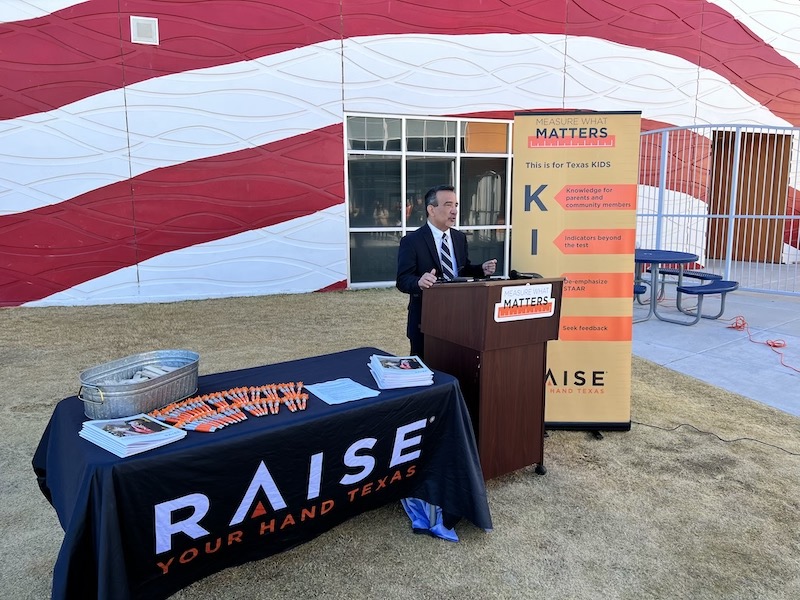
Following more than a year of research, data collection, and input from more than 15,600 Texans from hundreds of communities across the state, Raise Your Hand Texas officially called on state leaders to reform and rethink the State of Texas Assessments of Academic Readiness (STAAR) and the state’s accountability system.
Our assessment and accountability recommendations for the 88th Texas Legislature stem from Raise Your Hand’s Measure What Matters Assessment & Accountability Council, a group of expert education leaders, researchers, policymakers, and community leaders from across Texas. The council released its report in October 2022, concluding that the overemphasis on STAAR scores is harmful to teachers, students, and the public school system. According to the Council, reforming the A-F accountability system to de-emphasize STAAR and incorporate more measures of student learning and campus outputs would enable the Legislature to make meaningful progress toward teacher retention and align assessment and accountability more closely to public expectations around successful student learning.
Armed with the Council’s recommendations, on February 8, 2023, Raise Your Hand Texas kicked off a nine-city press tour, gathering education leaders who reiterated the recommendations and activated local communities around the advocacy effort. From business leaders and parents to superintendents, teachers, and students, Texans decried the current state accountability system for its one-dimensional view of student learning, especially at the elementary and middle school grades where STAAR is the only indicator to determine campus accountability ratings.
Insights about these issues from the nine-city statewide tour echo Raise Your Hand’s recommendations for an effective testing and accountability system, summarized as KIDS. Testimonials from an array of stakeholders confirm we’re not hearing the whole story when it comes to student learning and what our state needs to succeed in the future.
- K – Knowledge for parents and community members
- A single-letter grade tells an incomplete story to families, educators, businesses, and community members.
- We need multiple letter grades reflecting different kinds of work to give communities better insight into a school’s areas of strength and areas for growth, rather than a single summative score.
- I – Indicators beyond the test
- Add additional indicators to our accountability system, especially at the elementary and middle school levels, that reflect work we know contributes to positive long-term outcomes for students.
- D- De-emphasize STAAR
- STAAR test results should only count for up to 50% of the overall score in the state’s accountability ratings system.
- Eliminate tests that are not required by federal law including the 8th grade Social Studies STAAR test, the U.S History STAAR EOC exam, and the English II STAAR EOC exam.
- S- Seek feedback
- Families want to know if their children feel safe, secure, and engaged at school. Including a student safety and school climate survey can help to provide this insight.
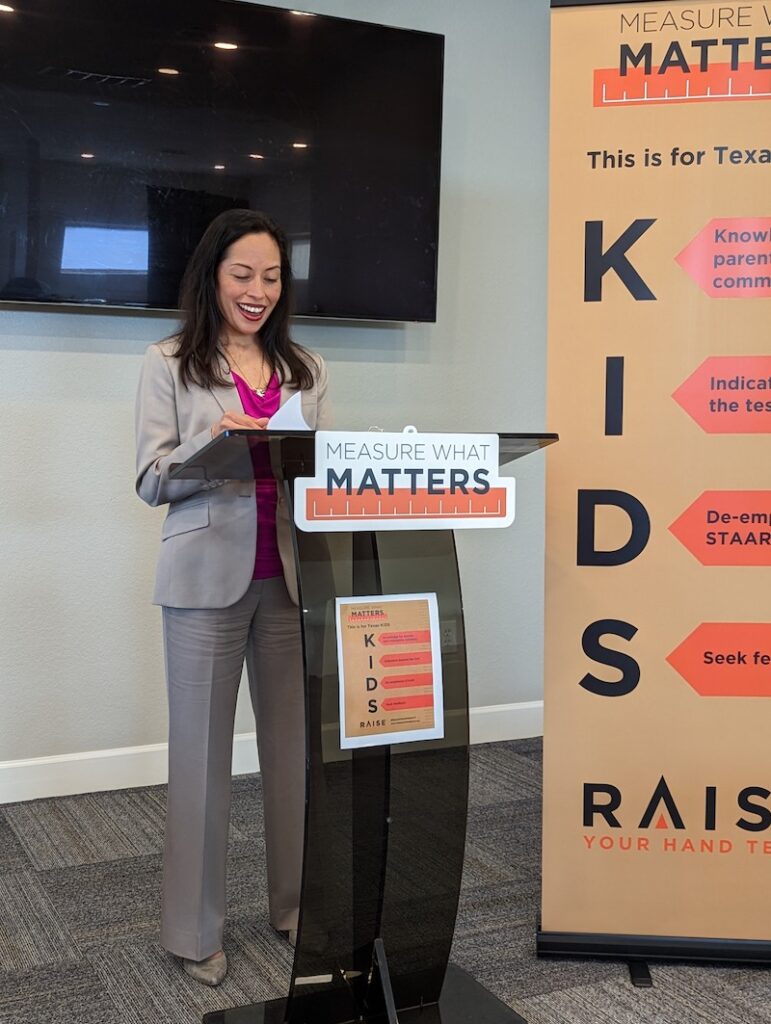
K: Knowledge for parents and community members. Families, educators, and business and community leaders need the whole story around student learning. A single grade from a single test does not lead to a holistic understanding.

At a gathering of education leaders in the Lubbock area, Macy Satterwhite, deputy superintendent of Lubbock-Cooper ISD, said, “We believe that our schools, our teachers, but especially our students, are much more complex than any one single test could ever indicate.”
The same sentiment was echoed all the way down in South Texas at a gathering at the Harlingen Chamber of Commerce. Dr. Alicia Noyola, superintendent of Harlingen CISD explained, “Thirty-two questions are measuring the quality of learning and experiences that happened over 173 days of school. Thirty-two questions are measuring the value of a teacher. Thirty-two questions are measuring the quality and effectiveness of a school.”
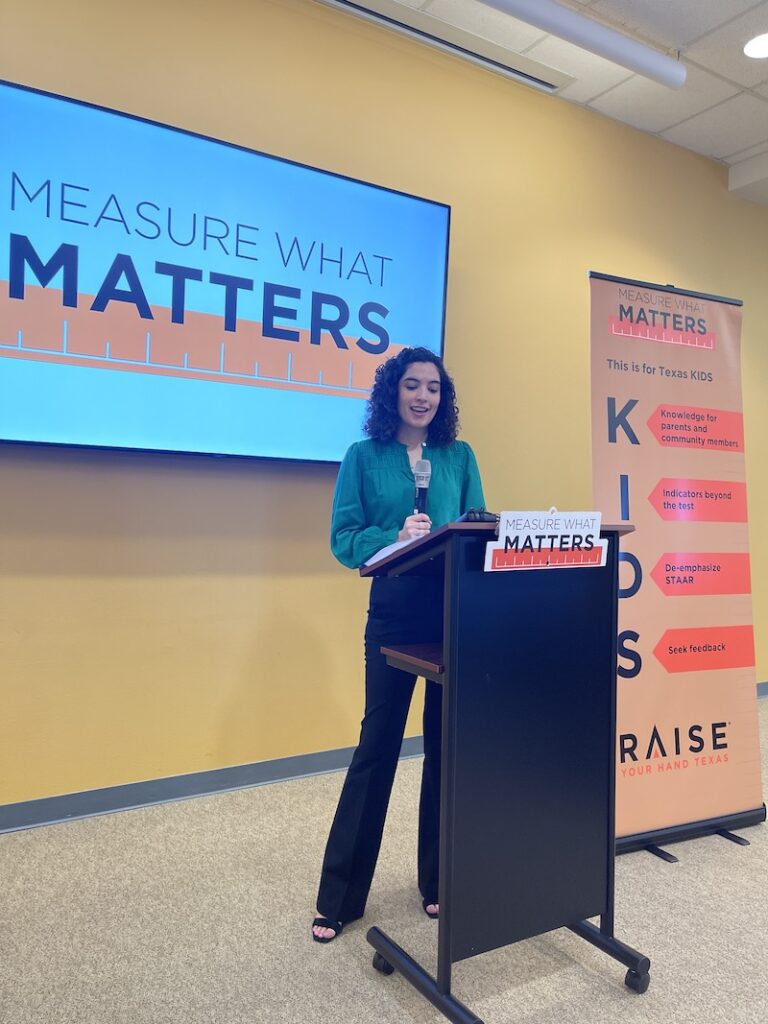
Lauren Kessel, a 7th-grade teacher in the Wylie ISD agreed. “Our students and our schools are more than one test score from one day,” she said.
I: Indicators beyond the test. Raise Your Hand believes we should base accountability ratings on more than STAAR scores to work toward positive long-term outcomes for students that reflect the thinkers and workers our state needs.
Satterwhite made a great analogy for this idea, stating, “Imagine if you go to the doctor for a well-check … and all he or she does is take your temperature.”
“If your doctor just took one measurement, they’re missing everything about the entire system,” she said. “That’s exactly what it’s like whenever we take one measurement and cast a judgment on a child, a school or a teacher based on that one measure.”
Superintendent Noyola reflected on her students in Harlingen CISD and said, “thirty two questions do not measure the success my third and fourth graders at Dishman Elementary experience when they win first place in nationals in chess.”
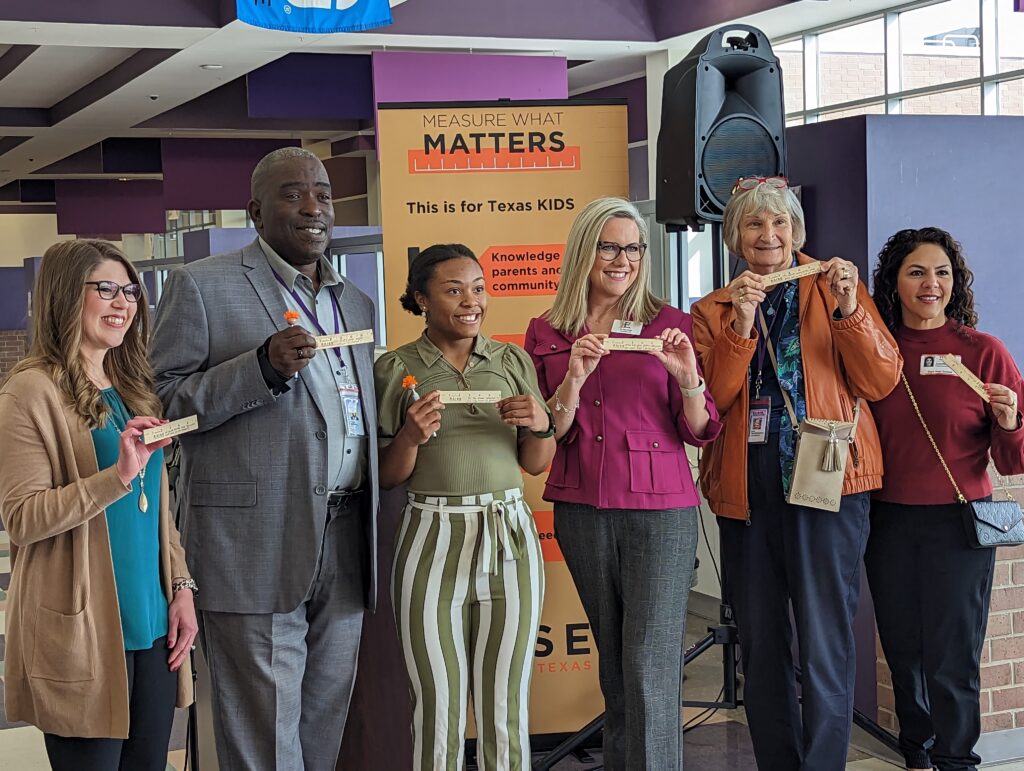
At an event at Angelina College in East Texas, Carnelius Gilder, superintendent of West Sabine ISD, said the way things are being done in schools right now is archaic. He said he would rather “educate the whole child.” He said he wants his students to “be able to contribute to society in a positive way, and wants his teachers to be able to build meaningful relationships with the students.”
This concept of multiple indicators for measuring student success can be especially important to the business community. Since the skills needed in so many industries–leadership, collaboration, teamwork, critical thinking, and creativity–cannot be measured by a single test, many Texas business leaders believe the state should look at a student’s whole story when considering school performance. At an event in Frisco, North Texas Commission CEO and President Chris Wallace talked about new businesses moving to the region, and how those leaders want “insight into a complete picture of educational success, not just how students did on a one-dimensional test on a single day.” He said, “a robust well-rounded educated workforce is the key component.”
D: De-emphasize STAAR. Raise Your Hand recommends STAAR count for no more than 50 percent of the overall score in the state’s accountability ratings.
Not only do community members agree we need well-rounded students for a well-rounded workforce, but many parents in particular worry about the effects of putting so much pressure on one test on one day.
“I dread this time of year. Students are mentally and physically drained, and educators are stressed, demoralized, and burned out. Increasingly, many of us are choosing to opt out of teaching. The sparks of innovation are diminished and the excitement that first drew me to the profession becomes obsolete.”
Clarissa Riojas
McAllen ISD TeacherAt a gathering in Wichita Falls, Burkburnett High School English teacher and parent Robyn Little recalled her daughter’s experience with testing anxiety. “So as a teacher I’ve seen the stress in my students,” she said. “But more so as a parent, I’ve seen the stress in my own children. When my daughter was in elementary school, she developed trichotillomania, when she would pull her eyebrows and eyelashes out as a result of stressing about the STAAR test. It is heartbreaking as a parent to see that a child you know is that stressed over one test on that one day.”
The pressure of a single high-stakes exam does not just affect students and families. It is also a major indicator of teacher stress. Frisco ISD Superintendent Mike Waldrip made this point at the North Texas event. Waldrip said the burden of the test is one of the main reasons teachers are leaving the profession.
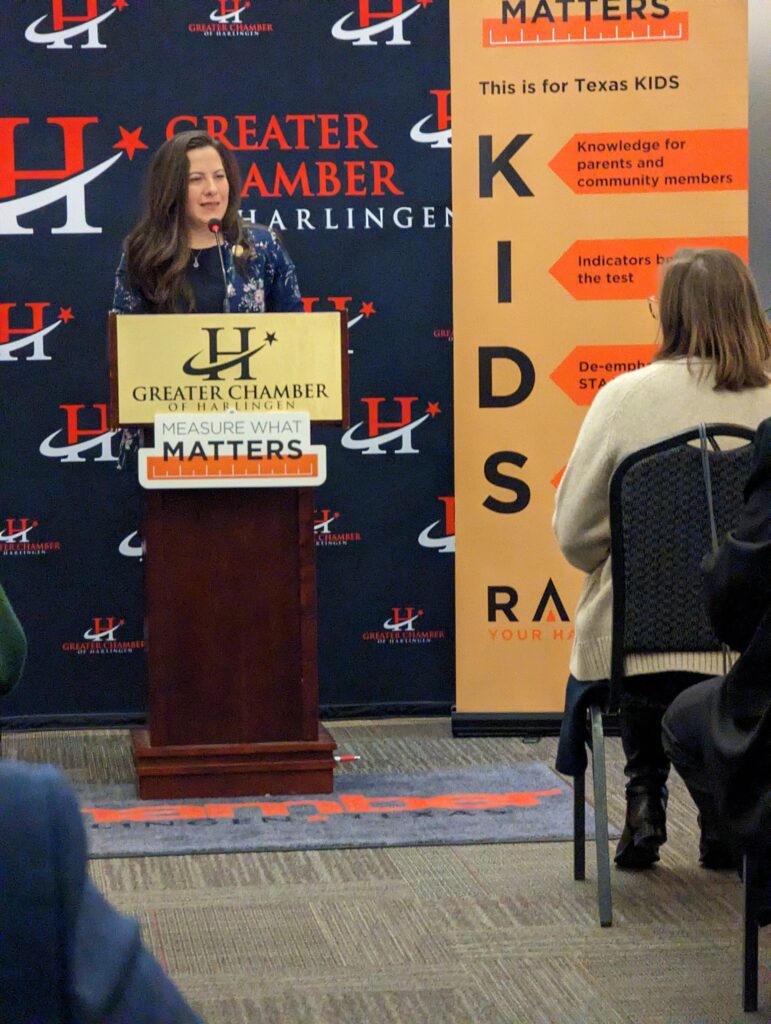
Clarissa Riojas, a teacher at McAllen ISD, brought this point home at the Harlingen event. She said, “I dread this time of year. Students are mentally and physically drained, and educators are stressed, demoralized, and burned out. Increasingly, many of us are choosing to opt out of teaching. The sparks of innovation are diminished and the excitement that first drew me to the profession becomes obsolete.”
S: Seek feedback. State standardized tests do not capture what Texas families and communities want to know about students. The accountability system should seek feedback from students to see if they feel safe, secure, and engaged at school.
At a gathering in Wichita Falls, Burkburnett ISD Superintendent Brad Owen brought up this point. “We want to know what does our community see that we need to do as a school district,” he said. “What are their hopes and dreams for our graduates and our kids, and how can we best monitor that and how can we best report the progress to that?”
From all the media events and insightful gatherings across the state where leaders advocated for reforms to the STAAR test and the state accountability system, the student participants summed it up best.
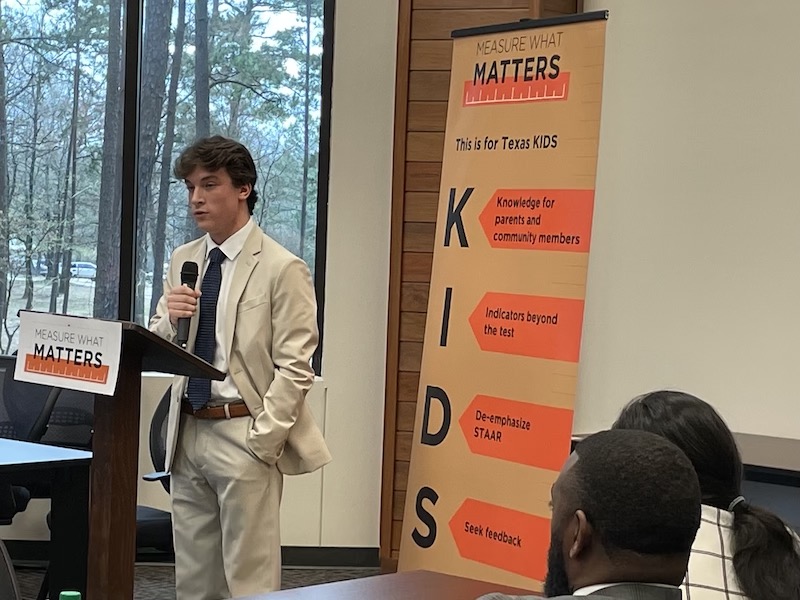
Julian Coleman, a senior at Plano West Senior High School, declared, “I’m here to tell you today that I’m not a number, I’m not a score.”
In East Texas, David Taravella, a senior at Nacogdoches High School, talked about how a productive future workforce of Texas will require things like “critical thought, individual creativity, collaboration, problem-solving, and communication, which are all skills the STAAR test simply cannot assess.” Taravella said, “Nacogdoches High School prepares hundreds of students every year to develop a productive workforce, create an informed citizenry and provide for social mobility, but if you look at our STAAR scores, you will see results that don’t tell the whole story. “
To meet the expectations of parents and students and the demands of college and careers, schools must do more than effective test prep. Now is the time to change our system so we can see the whole stories of our 5.4 million Texas students – and with that, the true performance of our public schools.
